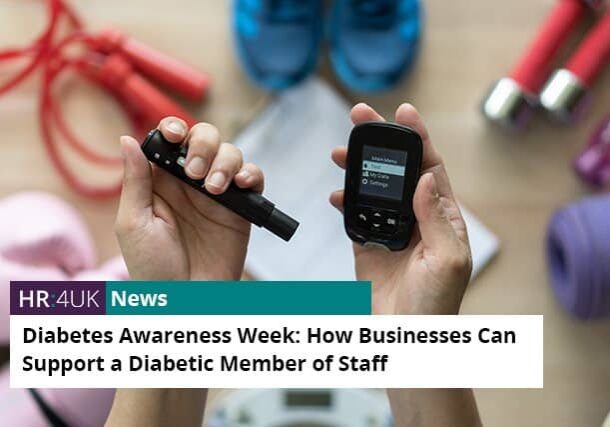Diabetes Awareness Week: How Businesses Can Support a Diabetic Member of Staff

It’s National Diabetes Awareness Week in the United Kingdom. Diabetes, which is one of the UK’s most common diseases and illnesses, can have an impact on business if not properly managed.
Around 10% of all cases of Diabetes in the UK have Type 1 Diabetes (being the most severe level of diabetes) with 90% of all other cases having Type 2 Diabetes.
Any member of staff who is diabetic will have the protection under the Equality Act 2010 even if they don’t consider themselves to have a disability as this is due to Diabetes being a life-long condition.
Here at HR:4UK we look at how you can implement some reasonable workplace adjustments to support a member of your team who has Type 1 Diabetes.
Top Tips in implementing reasonable adjustments in the workplace?
When working on supporting a person with Diabetes in the workplace, the first thing you should do is discuss, in confidence, with your Diabetic employee what steps you can take to accommodate their illness in the workplace. Having an understanding from them what support they will need will help you to support them.
From the list below, you’ll see some of the workplace adjustments that you could implement into your workplace:
- Discuss what to do in an emergency: Discuss with your employee what steps you should take if they have a ‘Hypo’ Attack. This would include who to phone – it’s recommended 999 in this case – as well as whether they need the first aider to administer a Glucose Injection – akin to an EpiPen. If so, discuss with the employee where and how your first aider should administer the Glucose Injection as it does require training on how to use it.
- Ensure they have a work ‘partner’: If your employee is happy to share their status as a Diabetic with the rest of their team, then ensure that you make a work colleague aware of their condition, including the tell-tale signs of related illness and what to do if you notice them. With flexible working a common element now, you’ll want to make sure that there is always a ‘partner’ on-site, accounting for partners who may be working from home.
- Understand the signs of High/Low Blood Sugar Levels: Signs such as shaking, heavy sweating, as well as the appearance of a person with Diabetes being drunk are the most common tell-tale signs that they are experiencing dangerously low/high blood sugar levels that if not attended to immediately, could cause hospitalisation. Linking this back to ‘Discuss what to do in an emergency’, this step is more broadly available to anyone in the workplace who may notice that the employee is showing signs of high/low blood sugar.
- Allow flexibility in hospital appointments: Your Diabetic employee will need to attend clinics throughout the year to have check-ups and reviews to help manage their Diabetes. For many people with Diabetes, these sessions only occur during working hours/days, and as such, rarely are available outside of working hours. Therefore consider offering your employee flexible working so that they fit their appointments around their work.
- Manage their workload: Ensure that your employee is given enough time in their workday to test their blood glucose (once every 3 hours is the average) and provide them with time to inject themselves with insulin if required. This can go further, depending on the person and their role, you may want to consider extra steps like having breaks during long meetings to allow them time to manage their Diabetes.
- Consider a risk assessment: As with any employee illness, it’s always advised that you conduct a risk assessment to identify and minimise any workplace risk they may face. You may also consider an occupational health assessment so that they can talk to a trained professional about their individual needs. For a person with Diabetes, this could include things as simple as offering sugar-free squash or sweetener instead of sugar.
- Workplace Storage: A person with Diabetes will have a lot of medication in their possession and you will want to ensure your employee is able to store their medication at work safely. For the insulin itself, it will need to be refrigerated, but for everything else, you’ll want a locked draw, as the kit will include sharp needles. Speaking of which, you’ll want to ensure you have a Sharps Bin (they’re free from the NHS) so that they can safely dispose of any sharp needles in the workplace.
Diabetic Terms you need to know
If you employ a Diabetic, you’ll want to become acquainted with the following keywords, as they will help you understand any issues being faced by your Diabetic staff:
Blood glucose levels (also called blood sugar): A measure of how much glucose (sugar) is in the blood.
Carbohydrate: The body’s preferred source of energy, which is broken down into glucose.
Complications: Health problems that can develop if you have had Diabetes for a long time: these include damage to the kidneys, eyes and nerves, heart disease and stroke.
Diabetes healthcare team: Different healthcare professionals who specialise in Diabetes, who make up a healthcare team.
Gestational Diabetes: Diabetes that develops during pregnancy but usually goes away after birth.
Hyperglycaemia: High blood glucose (sugar) levels.
Hypoglycaemia: Low blood glucose (sugar) levels.
Insulin: The hormone that keeps the levels of glucose in the blood under control.
How HR:4UK can help you
Diabetes in the workplace can be a difficult challenge, especially if you are unsure about how a person’s duties could impact the managing of the disease. Therefore, it’s always important to consult with both your staff member, and HR:4UK, when dealing with a Diabetic staff member, as together you’ll be able to create a safe working environment that conforms to the needs of the staff member under the Health and Safety Act.
To discuss with HR:4UK matters, such as employing a Diabetic staff member, or any other Employment Law or HR Issue, please call 01455 444 222 or email, [email protected].
Angela Clay
A qualified employment law solicitor and our managing director, Angela has unparalleled legal expertise and decades of experience and knowledge to draw from. She’s a passionate speaker and writer that loves to keep employers updated with upcoming changes to legislation, and is a regular guest speaker on BBC Leicester Radio.




